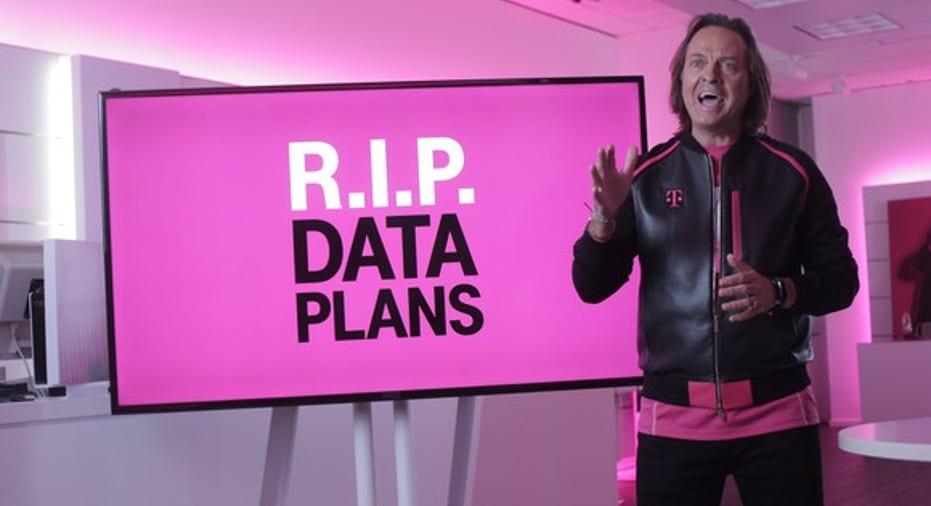T-Mobile's Biggest Challenge for the Future

Image source: T-Mobile.
The last few years have seen intense competition in the wireless industry, and the main provocateur has been T-Mobile (NASDAQ: TMUS). It started its Un-Carrier initiatives in 2013, when it dropped contracts, stopped subsidizing phones, and got rid of overage fees. Since then, the third-place wireless carrier has introduced 11 more benefits for its customers.
But T-Mobile's competitors have been quick to copy many of its promotions. Most recently, T-Mobile launched a promotion for customers upgrading to the iPhone 7, which was immediately replicated by Sprint (NYSE: S), AT&T (NYSE: T), and Verizon (NYSE: VZ). Additionally, Sprint copied T-Mobile's new T-Mobile One unlimited data plan within hours of its announcement.
Speaking at a recent Deutsche Bank conference, T-Mobile CFO Braxton Carter told the audience, "That's one of our challenges for the future: to do things that are harder to replicate, that are harder to recreate."
A differentiating factor
T-Mobile doesn't have the best network in the country like Verizon. It can't leverage a huge customer base of television and broadband internet customers like AT&T. And it's moving away from competing on price like Sprint.
T-Mobile's Un-Carrier promotions are its differentiating factor. But they don't provide much differentiation if competitors can quickly and easily copy them.
To be sure, some of T-Mobile's benefits are extremely difficult for its competitors to copy. Carter specifically points to Simple Global, which allows customers to text and use mobile data in over 140 countries. Other carriers can't offer nearly as much coverage, as T-Mobile primarily benefits from its relationship with Deutsche Telekom.
T-Mobile is also particularly well-positioned to offer unlimited data to all of its customers. It owns more spectrum per subscriber than AT&T and Verizon. Importantly, T-Mobile is also quickly refarming its old 3G network spectrum as it migrates customers to its LTE network for both voice and data. By contrast, AT&T offers unlimited data only to DirecTV subscribers, and Verizon doesn't offer unlimited data plans at all.
Where does T-Mobile go from here?
There's no question that T-Mobile's innovations in the wireless-service space have paid off. Since introducing its first Un-Carrier move in 2013, the company has gone from 20.1 million postpaid subscribers to 30.9 million postpaid subscribers. By comparison, Sprint has gone from 31.3 million to 30.9 million.
Meanwhile, AT&T and Verizon have seen the majority of their postpaid net adds come from lower-value connected devices, not smartphones like T-Mobile.
T-Mobile is still adding new customers faster than any of its competitors. But the rate is slowing down somewhat. Indeed, the entire industry is experiencing a slowdown in new customers as the market becomes increasingly saturated and users are holding on to their phones longer. (Customers typically switch carriers when they upgrade their devices.)
T-Mobile's Un-Carrier moves are excellent at getting people to stick with T-Mobile. The company's postpaid-subscriber churn rate fell to a record low 1.27% last quarter. But for T-Mobile to continue taking share from its competitors well into the future, it needs to do as Carter suggests -- develop benefits that are difficult to replicate.
That will be the standard by which investors need to judge T-Mobile's future Un-Carrier initiatives.
A secret billion-dollar stock opportunity The world's biggest tech company forgot to show you something, but a few Wall Street analysts and the Fool didn't miss a beat: There's a small company that's powering their brand-new gadgets and the coming revolution in technology. And we think its stock price has nearly unlimited room to run for early in-the-know investors! To be one of them, just click here.
Adam Levy owns shares of Verizon Communications. The Motley Fool recommends T-Mobile US and Verizon Communications. Try any of our Foolish newsletter services free for 30 days. We Fools may not all hold the same opinions, but we all believe that considering a diverse range of insights makes us better investors. The Motley Fool has a disclosure policy.



















